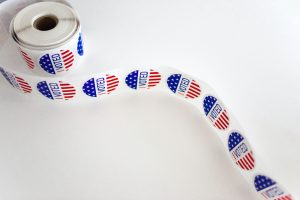Is your sign shop selling stickers or decals? If you’re not, you may want to consider adding it to your offerings as this small product can add up to big profits—especially with millennial customers.
There are over 75 million millennials in the U.S. with a population that recently overtook Baby Boomers. There is no doubt that marketing effectively to this market segment is essential for a business to survive and thrive.
According to Jeff Nicholson, Marketing Director at sticker and decal producer Websticker in Stowe, Vermont, “More than ever, promotional stickers are recognized as an essential tool in any business’s marketing mix.”
Millennials broadcast opinions, and word of mouth is more important than ever—everyone is increasingly aware of what others are doing. But, social media and word of mouth does not exist in a vacuum online. In fact, according to a study by The Keller Fay Group, 90% of word-of-mouth conversations about brands are taking place off-line. Nicholson points out, “Stickers are the original social media. They are a physical badge and mini-billboard that encourages word of mouth and builds off-line impressions.”
According to Social Chorus, only 95% of millennials say friends are the most credible source of recommendations and product information. This is why testimonials are so important. What is often overlooked according to Nicholson is that, “Stickers on cars, laptops, water bottles, etc. are basically testimonials and endorsements, not advertising. Stickers are “signs” of status that align with personal interests and values.”
Millennials are also buying values as well as products. They care about what a business stands for and what causes they support. This is not something that can be faked for marketing purposes—consumers have access to all the information they need these days to confirm alignment, or misalignment with a brand. Promotional stickers can help broadcast and strengthen personal values and beliefs. The brand, product or organization may even become secondary to a sticker’s core resonating message or design.
With millennials also being content creators (about half posting their own photos and videos), here lies another advantage of sticker marketing. According to Millennial Marketing, about 40% of millennials want to participate in co-creation of products and brands. User-generated content is 50% more trustworthy and 35% more memorable than brand imagery. This fits well with a sticker campaign as it is easy to involve fans online with sticker design and the development of the messages and designs that will resonate with their specific market.
A great example of effective millennial sticker marketing is J Skis founder Jason Levinthal. Jason involves his customers and community in everything from the creation of his product to its marketing. Jason says, “I was always of the mindset that you need to get your consumers not only as your advocates but also your marketing and advertising department. My goal is always to leverage my consumer following and stickers are my #1 way of doing that.”
“Because people are becoming less influenced by traditional advertising that interrupts, marketing has shifted to a more permission and connection-based model,” says Nicholson. “Today, there is nothing more effective than word-of-mouth marketing and endorsements from trusted sources. Any tool that can amplify and encourage conversations off-line is marketing gold and there is no doubt that properly designed, promotional stickers can be an extremely effective and affordable marketing tool.”









